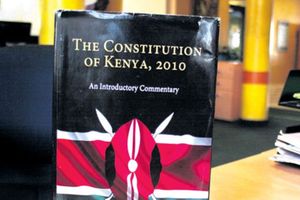
When reporting on a person's past wrongdoings, journalists must strike a balance between accountability, privacy rights and rehabilitation.
John Chebochok, elected a Kenya Tea Development Agency (KTDA) director on Friday, was featured in a BBC story over a year ago regarding a sex scandal involving female tea plantation workers. Should this personal history be relevant in a news story about his election? Where do we draw the line between a public figure's past and their present?
These questions emerge as two NMG platforms report the KTDA election differently. The Nation.Africa story on Saturday, “Man at the centre of sex scandal in tea sector elected as KTDA director,” highlights Chebochok's alleged involvement in sexual misconduct. Meanwhile, the Sunday Nation story, “KTDA election marred by confusion and low turnout,” focuses on the election's logistical issues.
This discrepancy in reporting raises questions about journalistic ethics, fairness, and bias. How journalists frame a story influences readers' perceptions. By focusing on Chebochok's scandal, Nation.Africa risks sensationalising his past actions. On the other hand, the Sunday Nation’s approach offers a more balanced perspective, emphasising the election's practical challenges.
Public interest
When reporting on a person's past wrongdoings, journalists must strike a balance between accountability, privacy rights and rehabilitation. In Chebochok's case, his alleged sexual misconduct is directly related to his tea industry role, making it relevant news. However, the information's presentation matters. In this case, leading with the scandal may not be the most balanced and respectful approach.
Although past wrongdoings may be relevant to a public figure's current position, they should be reported fairly and sensitively. Journalists should weigh the public interest against the individual's rights to privacy, rehabilitation and redemption.
***
Critiquing anonymous sources and headline accuracy: A reader, who wants to remain anonymous for fear of reprisals, has taken issue with two Nation.Africa articles: “Kenyan Diaspora in US reject Ruto's plan to engage Gen Zs” and “How Gen-Zs drove the Church back to God.” The first article, published on Sunday, raises concerns about credibility and authenticity. The second article, published on Saturday, raises concerns about headline accuracy.
The first article is based on “a scathing letter to the Kenyan government.” But it doesn’t name the author of the letter or his position. Nor does it tell readers why the author is not named. Further, the article doesn’t give the date of the letter, or how the Nation obtained it. And the article contains no direct quotes from the letter, which would have given it a level of authenticity and credibility. The letter without a named author and lacking context weakens the story's believability. Further, lack of direct quotes and supporting evidence for the claims made further weakens the story.
Hold talks
The article, by Steve Otieno, details how Kenyans in Washington DC have rejected President William Ruto's proposal to hold talks with the Gen Z protesters. However, the story lacks a distinct voice. In addition, the claims made about “the remains of those killed in Githurai” being held by the government would have benefited from supporting evidence and direct quotes.
Direct quotes add a level of authenticity and credibility to a news story. They allow readers to hear directly from the people involved, rather than just through the journalist's interpretation. Quotes can also provide context, clarity, and a distinct voice and perspective. While we can say the story might not be definitively false, stronger supporting evidence including naming sources, as well as using direct quotes, would significantly have improved the article.
Gen-Z actions
Turning to the second article, the reader argues that the headline exaggerates the relationship between Gen-Z actions and “driving” the Church “back to God.” The reporter, Justus Ochieng', states in the first paragraph that the claim is a joke. The headline writer should have used quotation marks to indicate it was just a claim, a joke. Or he should have penned another headline that reflects the content more accurately.
In summary, both articles show that solid evidence, direct quotes, and named sources enhance story credibility and accuracy.
***
Postscript: NMG rules require that if you grant a source anonymity you must tell readers why the person didn’t want to be named. This is what the reader told me: “I don’t want ‘Salimieni huyo’ to happen to me. If they can stop the Lavington United Church from hosting First Lady Mama Rachel Ruto, if they can force Murang'a Catholic Church from hosting Deputy President Rigathi Gachagua in another fundraiser, I fear what could happen to me.”
The Public Editor is an independent news ombudsman who handles readers’ complaints on editorial matters including accuracy and journalistic standards. Email: [email protected]. Call or text 0721989264













